The Biography of John Mead Gould
Part 4 (1867 - 1930)
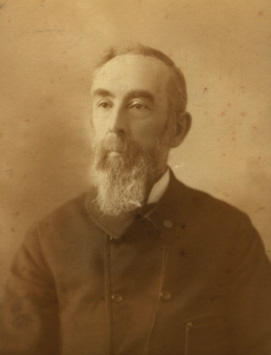
John Mead Gould circa 1900
Index
When John Mead Gould returned to Portland in the summer of 1867 he probably could not recognise the man he had become from idealistic and adventure hungry youth he was a little more than six years before. In that time he had seen war, slavery, illness, wrote a book length journal, lost and found love, started and failed in business, been married and concieved a child. At the age of 27 had had seen more of the country than most of his contemporaries.
While the most adventurous years of his life were behind him, he was begining a new life filled with the responsibilities of fatherhood and business.
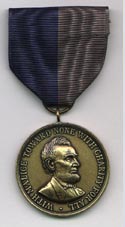
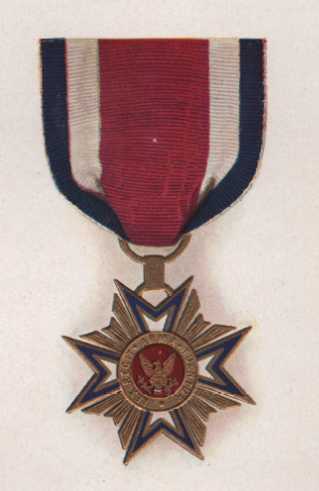

Medals John Mead Gould was Entitled to Wear.
(From left to right: Civil War Campaign Medal,
MOLLUS Membership Insignia and GAR Membership Badge.)
Like many Union Civil War Veterans, JMG joined the Grand Army of the Republic (GAR). The GAR was an organization for Civil War veterans of all ranks and was a powerful lobby group in the late 1800's. There are ancecdotes of Gould proudly wearing his GAR uniform on a regular basis. JMG marched in the Grand Army parade when they held thier annual encampment in Portland in 1885.
JMG also became active in the veteran's association of the 1st-10th-29th Maine and was chosen on August 12th, 1869 "Historian, Secretary and Treasurer".(PH) As he had faithfully kept his diary throughout the war, he was chosen to write the Regiment's history which he did from 1869 to 1871. A number of persons have praised the history for its clarity for presenting day to day life in the Civil War. (JMG's war diary has been recently republished by Butternut and Blue Books of Baltimore.)
Gould's first employment after returning to Portland was with J.B. Brown and Sons. This was short lived and extending only from September 20th through November 2nd, 1867. He was also employed by the C.P.K. Company from November 5th, 1867 until its failure on February 9th, 1875.(PH)


Annie Allender Gould (1867 - 1900) in the early 1870's and the late 1890's
On November 18th, 1867 JMG's wife Amelia Gould gave birth to a daughter who was named Annie Allender Gould. Annie was extraordinarally bright and graduated from Mount Holyoke College in 1892. She had pursued the "Scientific Course" of study and was chosen as class valedictorian. Her address was entitled "The Choice of Duty". She then was called by God to enter the mission field in 1893 and was sent to China where she worked in the city of Pao-ting-fu (today known as Baoding), located about 100 miles southwest of Peking. She was martyred there during the Boxer Rebellion on July 1st, 1900. he remains were recovered the next year and returned for burial in the Riverside Cemetery in Bethel. A memorial window in her honor is at the Second Presbyterian Church in Portland. The local chapter of the Daughters of Union Veterans was named Annie Allender Gould Tent No. 1 in her honor.
How to Camp Out
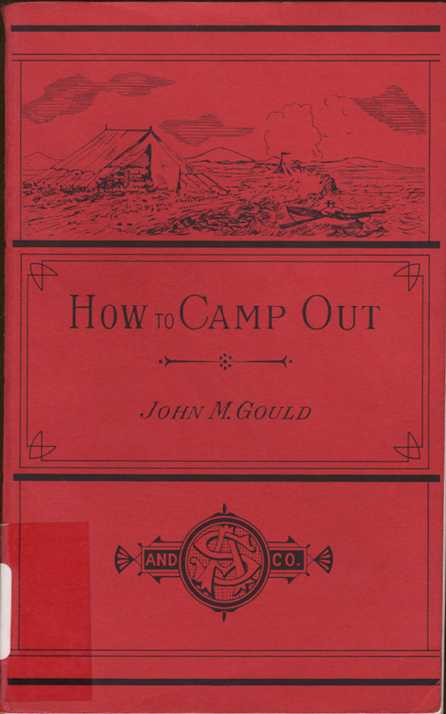
Cover of Reprinted Edition of How to Camp Out
(The cover of original hardcover was light green.)
In 1877 JMG wrote his second, and last, book. How to Camp Out was based on his military service as well as postwar experience with a favorite pastime. It was published by A. S. and Company in 1877 and reprinted as a paperback by Walking News, Inc. of New York in 1982. The book provides valuable insight into camping long before the days of L.L. Bean, Coleman lanterns, Eastern Mountain Sports, Gortex and internal frame backpacks.
In How to Camp Out JMG offers homespun and hard learned advice like -
"Do not be in a hurry to spend money on new inventions."
"A common tin cup is as good as anything as you can take a drink from."
"A moderately short cut to the hair ... is advisable for comfort and cleanliness."
"Wear what you please if it be comfortable and durable: do not mind what people say. When you are camping you have the right to be independent."
"You have probably read that a soldier carries (equipment) weighing forty or fifty pounds. You will therefore say to yourself, 'I can carry twenty.' Take twenty pounds, then, and carry it around for an hour and see how you like it."
"You will need to exercise more care in the selection of shoes than any other article of your outfit."
"Eat with your hats on as it is more comfortable, and the wind is less apt to blow your stray hairs into the next man's dish."
"Ladies must be cared for more tenderly than men."
Although JMG was, by modern standards, a chauvanist he did feel that it was "thoroughly practicable" for ladies to engage in walking and camping - though not without masculine assistance. - "Of course there must be gentlemen in the party; and it will save annoyance to have at least one of the ladies well-nigh middle-aged." This last provision probably being to forestall any percieved or actual impropriety on the part of the gentlemen.
Gould also devotes five pages on how to keep a diary. Subjects covered include selection of paper, being sure to mention details and the importance of having a daily habit of writing in the diary. If the reader should find Gould's zeal for this subject excessive, he should be reminded that it is because of JMG's obsession with recording his life and times for posterity that this technological memorial is possible.
Through the wonders of modern technology How to Camp Out has recently be published on-line as an E-book by Project Guttenberg. You can read How to Camp Out in its entirety at this link -
How to Camp Out E-Book

The Gould Family circa 1878.
JMG and his wife also had two other children named Oliver Cromwell (b. April 20th, 1870) and Theodore (b. December 12th, 1873). Both had careers in banking in Portland and are buried in the family plot in Bethel.
Professional Career
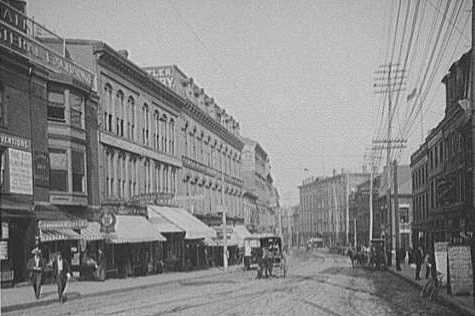
Middle Street in Portland in the Late 1800's
JMG then settled into the family business of banking. He was first employed as a teller at the National Traders Bank (formerly known as the Merchants and Traders Bank) on August 19th, 1868 and was promoted to cashier on May 1st, 1893.


The National Traders Bank was a mid-sized bank for its day. In 1904 it had assets of $703,556.77 which was dwarfed by the three biggest banks in Portland - Portland National, Casco and Canal with 4, 3.7 and 2 million in assets respectively. (Report on the Condition of the National Banks as of Tuesday, September 6th, 1904. U.S. Department of the Treasury.) In this position JMG had enough money and social prestige to enjoy solid upper middle class status.
The National Traders Bank was liquidated on August 8th, 1908 and was absorbed by the Fidelity Trust Company of Portland. Gould was employed there briefly (his son Theodore was the assistant treasurer) as a note teller but was retired by 1915.
If Gould were alive today he would most probably be pleased that his bank now houses a bookstore which stocks his War Journals. He would also be happy to see that the band's vault and safe are intact as well.
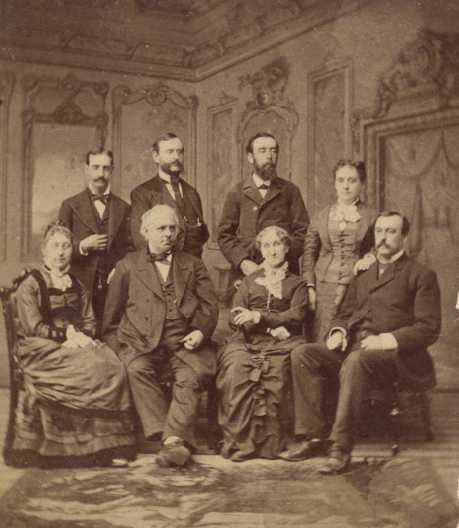
JMG with His Parents and Siblings c. 1870's.
JMG's earnings were never excessive but were sufficient to provide for a wife and three children as well as a house in Portland and a summer cottage in the Loviett's Field neighborhood of South Portland. He purchased the land on October 3rd, 1877 and built the cottage in 1878. This cottage was replaced about 1930 by his son Oliver with a substantial three bedroom two story house costing $10,000 which is today 21 Gould Road in South Portland (and, incidentally, worth about $500,000 in the early 2000s). Gould Road was thus named as JMG had built the first house thereon.
JMG also recieved an annuity of $330.00 yearly from the Pennsylvania Mutual Life Insurance Company of Philadelphia. In addtion to this he recieved a federal pension of $15 a month for his Civil War service starting on April 25th, 1891 to date from March 14th, 1890. This was increased to $25 on May 16th, 1912 and increased to $30 on his 75th birthday and $50 on his 80th in 1919.
On September 8th, 1879 he purchased the Andrew Senter house and lived there until May of 1894 when he moved into his father's house at 46 Pearl Street (later renumbered 148) in Portland and would live there for the rest of his life. He sold the Senter house to Peter Johnson on February 9th, 1895.
(PH)
JMG was elected a member of the Military Order of the Loyal Legion of the United States (MOLLUS) on April 12th, 1882. He was issued MOLLUS insignia number 2505. This organization's original membership was limited to officers who served in the Union armed forces during the Civil War and was later expanded to include their descendants.
JMG did not long remain active in MOLLUS as he was "smoked out" and "liquored out" of meetings. Smoking and drinking offended his puritanical sensibilities and also conflicted with his position as a Sunday School superintendent. He submitted his resignation from MOLLUS on December 6th, 1882 becoming the first of only two MOLLUS members from the Maine commandery to resign as of 1906.
On February 19th, 1884 he was appointed a Deacon of the Seamen's Bethel Church of Portland. On January 2nd he was chosen a trustee of the same church. (PH)

John and Amelia Gould about 1897
(Click for Larger View.)
On December 14th, 1898 he was elected an "Associate member of the Corporation" of the Maine Industrial School for Girls in Hallowell which he accepted on December 28th. On March 29th, 1899 the organization's Charter and By Laws were changed reducing the membership of the board and the surplus members were expected to resign. In reaction to this JMG wrote - "while an 'easy loser' I have often wished I could have stayed on the board permanently".(PH)
Alice Gould
On October 7th, 1899 JMG's first grandchild was born to his son Oliver Cromwell Gould and his wife the former Grace Brown Chapman. JMG, in his typically meticulous style, began to keep a diary for his newest progeny. The diary's first entry is self explanitory.
"Alice Gould was born in the front chamber of house No. 148 Pearl Street, Portland, Maine U.S.A. - the house of her grandfather; which prevously had been owned by her great grandfather Edward Gould.
"The birth was a week or so ahead of expectations; the mother had come from Bar Harbor (on) September 16th but Oliver could not get away from the First National Bank there, where he was cashier, until this same Saturday night. Therefore it was thought wise to notify him by telegraph.

Yacht Columbia by Antonio Jacobsen
"Going to the telegraph office the grandfather encountered a great throng of people watching the bulletins concerning the great international race between Sir Thomas Lipton's 'Shamrock' and the Yankee 'Columbia'. The 3:45 dispatch announced that the Columbia was leading but the wind was dying and the race could hardly be finished in regulation time.
"Our little baby had finished - and that too ahead of time. The name 'Columbia' was suggested thereby and the telegram was worded - 'Good afternoon papa. Mamma is very well. Grandma very happy. From your little daughter - Columbia Gould." (Source - "Diary of Alice Gould" written by John Mead Gould. This is an unpublished family record.)
Family tradition holds that Oliver rushed home and had his daughter's name changed to Alice. JMG, with his usual thrift, deposited $10 in her name at the bank.
In the roughly 100 pages of Alice Gould's diary we learn about the upbringing of a bright girl at the turn of the century but we are also provided with insights into the character of John Mead Gould.
The most striking feature is his unbridled enthusiasm for recording each important detail of his grandaughter's development. Another is that we can see the depth his devotion to her. This can be explained, of course, by the natural affection which all grandparents feel toward their progeny. However, one cannot discount the fact that JMG's own daughter Annie had died when Alice was only 8 months old and he must have sought in her some compensation for the loss of his daughter.
Alice would graduate from Mount Holyoke College in 1920 and later recieve a master's degree in public health from Yale University. She married Theophil Laanes, a native of Estonia, and they had two children named Anne (b. 1934) and Carl (b. 1935).
Top
Final Years

JMG in 1913 - Age 73.
JMG lived the rest of his life in Portland - a respected member of the community and well known in most social circles.
While older, he did not lack for excitement. On Feburary 26th he was sleeping in the sitting room of his house (on account of the children having the whooping cough) when he heard a burglar which he scared away. The burglar's name was Edward Laydon and he was caught a week or two later in the cellar of Thomas Loring apothecary in Portland.
On September 16th, 1912 Gould was chosen treasurer of the committee managing the Portland meeting of the A.B.C.F.M. (American Board of Commissioners for Foreign Missions). On April 3rd, 1914 he was selected as one of 40 managers of the Portland Exposition Building.
In 1920, when he was 80 years old, JMG wrote, on the back of a photograph of himself walking in Monument Square in downtown Portland, the following poem:
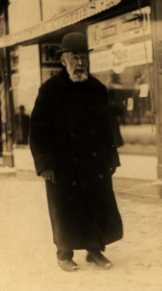 |
Behold how slowly-lowly low
This old codger is compelled to go.
Because of ice and snow and sleet
There's no foundation for his feet.
And furthermore behold the snow
That's caught and stays upon each toe;
And see the dread, exprest so plain
Lest he should slip and fall again.
Poor Uncle John, he's all a-scare
As he steps slowly thru "the square"
Lest he should fall and break his back
Or give his head a mighty crack.
|
This poem, in many ways, captures John Mead Gould's personality. There egotism combined with self deprecation as well as a keen awareness of his own mortality and ultimate insignificance. It seems ironic that one who in his youth had risked the perils of war would be subdued by the common forces of nature. Indirectly John Mead Gould seems to be saying, "I am now a frail old man. If I have accomplished anything worth while it will be for future generations to judge. I am ready to depart this mortal life and exchange it for the embrace of my Creator." (This quote is not from JMG - it is meerly the author's impression of Gould's thoughts may have been at the time.)
Gould's last earthly honor was on December 26th, 1923 when he was elected president of the Portland Society of Natural History of which he had been a member since December 15th, 1858.
On his eighty-fifth birthday, December 15th, 1924 Gould gave this summary of his status at that day - "I have thought that I would make and extensive record of how I am growing old but one thing more than any other must not be omitted, I cannot utilize the time as in all my previous years. I must get to bed by 9PM or suffer the next day. I cannot get up till 7:00, so there is an hour cut off each end of the day.
"I have a "den" over the kitchen of #148 Pearl (Street) but don't live there at all and I almost abuse my wife by not allowing her to clear up or clean up or disturb anything there ... too bad, I like to have a place for everything and everything in its place. Once also I would find an ink that would flow, and not be more like black mud than ink."
John Mead Gould's final years were marred by the deaths of the two people closest to him.
The first to pass away was his lifelong best friend Professor Edward Morse on December 20th, 1925. On hearing of Morse's passing Gould wrote - "What is the world and life here if no Ed Morse?"
Gould's loss was coupled by the physical deterioration of his wife Amelia. On March 11th, 1926 he wrote - "Poor Amelia, she is not only sick, coughing very hard much of the time, but she feels as if her life is worse than useless." Four days later he added - "She is too deaf to hear ordinary conversation." Amelia died later in the year.
Without the two people closest to him, Gould would have to walk the last mile of life lacking the companionship and support they both provided him. He was cared for in his "second childhood" by his son Oliver and his daughter-in-law Grace.
As his life drew to a close, he wrote, on October 31st, 1929, "I am all gone." to this he added on November 2nd, "I am half crazy at times but not (with) any of the common crazyisms." After this there were but a few illegible and incoherent entries in his diary which expressed some concern about his son Theodore's financial secuity. (The great depression had just begun with its disasterous impact on the banking industry. The Goulds, apparently, were as unprepared for the colapse as their peers in the profession.)


Gould Family Plot Stone and John Mead Gould's Grave Marker
Riverside Cemetery, Bethel, Maine
John Mead Gould died on January 1st, 1930 at his home in Portland at the age of ninety. He mortal remains are buried, along with those of many of his relatives, in the Riverside Cemetery in Bethel, Maine.
Top Return to Part One John Mead Gould's Homepage
Related Websites
Please visit some of the links below. I think you will find them entertaining and informative.
Alta Vista Listings for John Mead Gould.
An Online Review of JMG's War Diaries.
Histories of Maine Regiments Contains brief historical sketches of the Maine Regiments and lists published regimental histories.
First Maine Heavy Artillery Learn about the regiment which suffered the highest casualty rate in the Civil War.
20th Maine Website Packed with information about the "other" famous Maine regiment.
Military Order of the Loyal Legion of the United States A lineage society for descendants of Union Officers.
Sons of Union Veterans An organization of the descendants of the Soldiers, Sailors and Marines of the Union Armed Forces.
Generals of the Civil War
United States Civil War Center Sponsored by Louisiana State University the CWC seeks to be a comprehensive on line resource for the Civil War.
Theodore Roosevelt Page JMG was a lifelong Republican and voted for TR in 1904. Find out about the kind of President America needs to lead it into the 21st Century. (Hint - its the same kind of president that led us into the 20th Century.)
Maine Military Historical Society Museum
Center for Maine History The repository for John Mead Gould's journals.
Civil War Photos
A great collection of rare and unusual Civil War photographs. A must see!
C & D Jarnagin Company manufactures and sells authentic reproductions of Civil War era gear. A great resource for Civil War reenactors and military history buffs.
Library of Congress Photos of Portland, Maine These photos date from 1880 to 1920 and feature a number of American subjects including Portland, Maine where JMG spend most of his life. They are also significant in that they were all taken during his lifetime.
1876 Bird's Eye View of Portland, Maine JMG owned a copy of this outstanding lithograph showing Portland as it was for most of his life.
Antietam On the Web Learn about the "Bloodiest Day of the Civil War".
Center for Fort Preservation and Tourism America's forts are big, beautiful, historic and endangered - visit them on the web and in person. (John Mead Gould would want you to.)
New England Historical and Genealogical Society John Mead Gould's brother, William Edward Gould, was a long time member of the NEHGS. It is the oldest and best organization for researching your sainted and extinguished New England ancestors.
General Society of Mayflower Descendants John Mead Gould was a descendant of Isaac Allerton and, possibly, Francis Cooke who were both on the Mayflower on her fateful voyage into history in 1620.
Hereditary Society Blue Book In the late 1800's it became fashionable for members the the upper middle classes in New England to join hereditary societies which required that one had an ancestor who met certain qualifications to join. (The General Society of Mayflower Descendants and the Daughters of the American Revolution are probably the two most famous.) The Historic Trust maintains a "Blue Book" listing all such organizations. It is not known if John Mead Gould belonged to any such organizations but he could have joined several if he so chose.
 Send E-mail to jmgould39@yahoo.com
Send E-mail to jmgould39@yahoo.com
Use YAHOO! To find other Civil War related sites.
Top
Part 1 Part 2 Part 3
John Mead Gould's Homepage



















 Send E-mail to
Send E-mail to